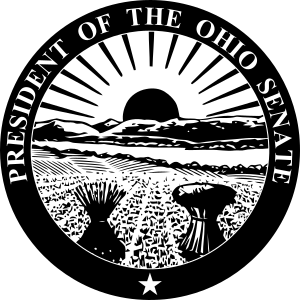Abraham Shepherd facts for kids
Quick facts for kids
Abraham Shepherd
|
|
|---|---|
 |
|
| Speaker of the Ohio Senate | |
| In office December 2, 1816 – December 6, 1818 |
|
| Preceded by | Peter Hitchcock |
| Succeeded by | Robert Lucas |
| In office December 4, 1826 – December 2, 1827 |
|
| Preceded by | Allen Trimble |
| Succeeded by | Samuel Wheeler |
| 5th Speaker of the Ohio House of Representatives | |
| In office December 1, 1806 – December 6, 1807 |
|
| Preceded by | John Sloane |
| Succeeded by | Philemon Beecher |
| Personal details | |
| Born | August 13, 1776 Shepherdstown, Virginia |
| Died | January 16, 1847 (aged 70) Putnam County, Illinois |
| Political party | |
| Spouses |
|
| Children | twelve |
| Military service | |
| Allegiance | United States |
| Branch/service | Ohio Militia |
| Rank | captain |
| Battles/wars | War of 1812 |
Abraham Shepherd (1776–1847) was an important politician from Ohio, United States. He was a leader in both the Ohio House of Representatives and the Ohio Senate in the early 1800s.
Contents
Early Life and Family
Abraham Shepherd was born on August 13, 1776. His birthplace was Shepherdstown, Virginia, which is now in West Virginia. He was one of seven children born to John and Martha Nelson Shepherd.
His father, John Shepherd, fought in the American Revolutionary War. John also ran a mill, and he taught Abraham how to run the family business.
In 1787, Abraham's family moved to Wheeling Creek. Later, in 1793, they moved to Limestone, Kentucky. After two years there, they settled in Red Oak, which was in Adams County, Ohio at the time. This area was part of the Northwest Territory.
In 1799, Abraham Shepherd married Margaret Moore. They lived in Red Oak for a short time. Then, they built a brick house and a mill on Eagle Creek. This mill later became known as Pilson's Mill. Abraham also created a cemetery called Baird's Cemetery.
Political Career
In October 1803, Abraham Shepherd was elected to the Ohio House of Representatives. He was one of three representatives for Adams County. He started his term on December 5, 1803.
He was re-elected in 1804, 1805, and 1806. During the 1806-1807 session, he served as the Speaker of the Ohio House. He was elected to the Ohio House again in 1809 and 1810.
Military Service
During the War of 1812, Abraham Shepherd served as a captain. He led a company in the Ohio Militia in 1812 and 1813.
Serving in the Ohio Senate
Shepherd returned to the state legislature in 1815. He was elected to the Ohio Senate for a two-year term. He became the Speaker of the Senate during the 1816-1817 session.
He was elected for another two-year term in 1817. He was again chosen as Speaker during the 1817-1818 session. In December 1817, he helped pass a law to create Brown County, Ohio. This new county was formed from parts of Adams and Clermont counties. Abraham Shepherd then lived in the new Brown County.
In 1816, he was also a Presidential elector for James Monroe. This meant he helped formally elect the president.
In 1818, the first court in Brown County was held in Ripley, Ohio. Abraham Shepherd was appointed as the clerk-of-courts for seven years.
He returned to the Senate in 1825, representing Adams and Brown counties. During the 1826-1827 session, he was once again the Speaker of the Senate. In 1825, Ohio changed its tax system. A State Board of Equalization was created, and Shepherd represented the 5th congressional district on this board.
Later Life and Beliefs
Abraham Shepherd ran Pilson's Mill on Eagle Creek until 1817. He then moved to Ripley, Ohio. In Ripley, he built another mill that used steam power as early as 1825. He also worked as a pork-packer.
He was involved in the Masonic lodge in Ripley in 1818. He was also an elder in the Presbyterian Church. He attended church meetings (called Presbyteries) in Chillicothe in 1823, 1830, and 1832.
Abraham's first wife, Margaret, passed away in 1818. They had ten children together. On October 19, 1819, he married Harriet Kincade. They had two more children.
In 1834, Abraham Shepherd faced some financial difficulties. He then moved to Putnam County, Illinois. He passed away there on January 16, 1847.
Shepherd was a member of the Democratic-Republican Party and later the Democratic Party. However, he later left the party because he disagreed with them about slavery. He became an abolitionist, which meant he worked to end slavery.
 | Bayard Rustin |
 | Jeannette Carter |
 | Jeremiah A. Brown |

